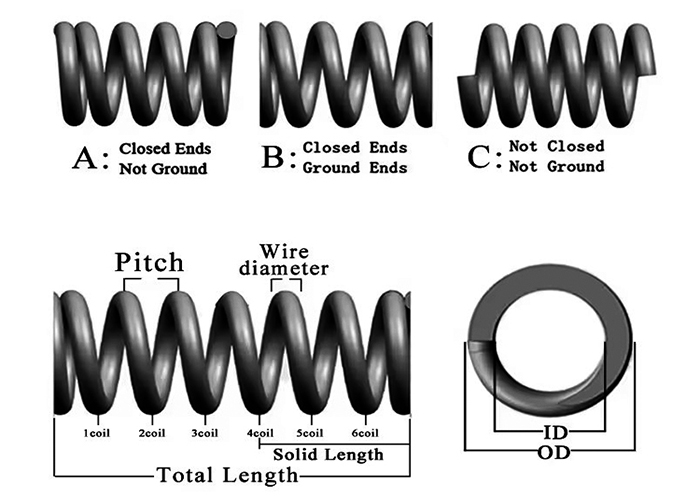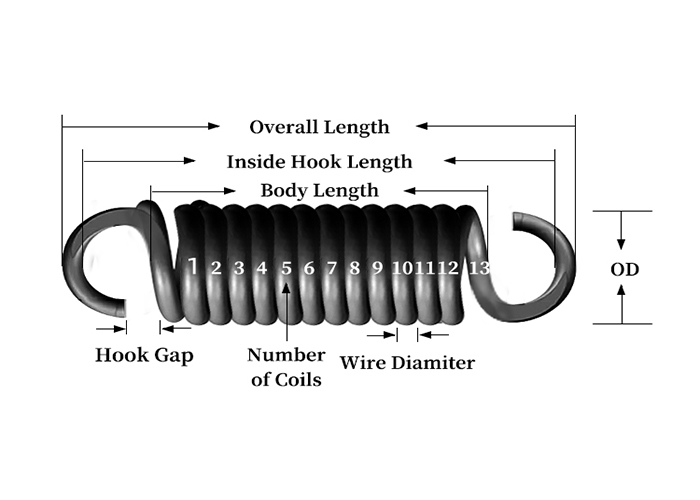We specialize in manufacturing top-quality brass springs,delivering exceptional performance and reliability for your projects.From design to production,every step is meticulously controlled to ensure we provide the perfect solution for you.Whether you need high conductivity or durability,our brass springs meet the stringent demands of various applications
Brass Specifications:MK-BS-CS01、MK-BS-CS02、MK-BS-CS03、MK-BS-CS04、MK-BS-CS05、MK-BS-CS06
Brass springs are used in devices like switches,connectors,and terminals due to their conductivity and non-magnetic properties.
Ideal for corrosion-resistant environments,brass springs are found in valves,pumps, and pipe fittings.
Used in fuel systems and exposed components for their corrosion resistance.
Brass springs offer durability and conductivity in sensors and control systems.
Brass springs add both function and elegance to high-end items with their golden-yellow color.



We have the capability to provide our customers with custom brass springs to meet nearly any specification

We offer professional brass spring solutions designed to help you achieve optimal performance and reliability.Whether you need high elasticity,excellent corrosion resistance,or precise dimensions,we provide customized brass springs to meet your diverse needs.
Choose our brass spring solutions to enhance your product’s performance.Contact us today for more detailed information and professional advice!
With a series of rigorous tests and professional technical support, we are confident in the quality of our brass springs. We are committed to providing customers with high-performance, durable, and reliable brass springs, ensuring their stable operation in complex environments.
If you are interested in our brass spring products or have any questions, feel free to contact us. We are dedicated to serving you!
Material Analysis:
The composition of brass directly impacts the performance of the spring. Through material analysis,we ensure that the brass used in our springs meets industry standards,offering superior corrosion resistance and conductivity.
Tensile and Compression Testing:
The modulus of elasticity of brass springs determines their response to tension and compression.During testing,we evaluate how the spring performs under different loads to ensure it can withstand repeated loading and unloading in real-world applications.
Corrosion Resistance Testing:
Brass springs are often used in humid or corrosive environments.We conduct tests like salt spray testing to simulate actual working conditions and verify the spring’s resistance to corrosion in harsh environments.
Fatigue Testing:
Springs may fail due to fatigue when subjected to repeated loads over time.We conduct fatigue tests by repeatedly loading and unloading the spring to ensure that the fatigue life of our brass springs meets the required standards.
Tailored for your precision needs! We specialize in manufacturing brass springs that offer excellent corrosion resistance and conductivity, perfect for various electronic, electrical, and industrial applications. No matter the size or shape you require, we provide high-precision custom services to ensure each spring fits your design needs perfectly.
Enhance the performance of your products by choosing us for high-quality brass spring solutions! Contact us for custom orders and enjoy professional service with fast delivery!

If you have any other specific questions about brass springs or need more detailed answers, please feel free to contact us!
Brass springs are not typically used for high-stress or high-temperature applications.While they are durable and corrosion-resistant,they lack the strength of steel or other alloys under heavy loads or extreme temperatures.For such conditions,materials like alloy steel or stainless steel are more suitable.
Yes, brass springs are well-suited for outdoor use due to their corrosion resistance.However,in extremely harsh environments, additional surface treatments may be necessary to prolong their lifespan.
Brass springs generally require minimal maintenance. However,if they are exposed to harsh or corrosive environments,regular cleaning or protective coatings may be necessary to prevent surface oxidation or tarnishing.
Yes,brass springs can be customized in terms of size, shape,and tension based on specific requirements,including unique mechanical,electrical,or environmental needs.
From the initial spring design to the manufacturing and delivery.Our best practices and quality assurance ensure you end up with the precise parts made just for your project. Every solution is designed for your needs.

Compression springs are a common type of spring designed to resist compressive forces. These springs are typically coiled and are widely used in applications like automotive suspensions, industrial machinery, and electronic devices.

Die springs are designed for high-load applications, commonly used in stamping dies and die sets. These springs are usually made of high-strength alloy steel, providing greater resistance to compression and longer service life.

Tension springs store energy when stretched and return to their original shape when released. They are commonly used in applications such as door locks, toys, and mechanical devices. Tension springs typically have hooks on both ends for attachment.

Headless tension springs are similar to regular tension springs but lack traditional hooks or ends. These springs are used in applications requiring specific attachment methods to meet design requirements.

Clock springs, also known as mainsprings, are coiled springs used to store mechanical energy. They are widely used in clocks, toys, and other devices that require energy storage. These springs can be wound manually or mechanically and then release energy to power mechanical devices.

Torsion springs are designed to withstand torque or rotational force. These springs are commonly used in clips, switches, garage doors, and other devices where rotational force is applied, providing a counteracting force by twisting.

Brass springs are made from brass material, offering excellent corrosion resistance and electrical conductivity. They are often used in applications requiring corrosion resistance or electrical conductivity, such as electrical switches and terminals.

Wire forming include various springs and parts formed by bending metal wire into shapes. These are custom-designed for specific applications and can be made into complex shapes to fit unique mechanical or electronic devices.
Obtain firsthand quotes and product information; we are available 24/7 to assist you with any inquiries.
info@makeway-llc.com
+86 755 28459980
Room 1510, Building 13 Huanancheng, No.1 Ping'an Avenue, Longgang District, Shenzhen, Guangdong, China